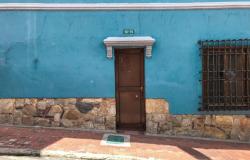From Brody to Bogotá (and Medellín): Why Hans Kelsen Is More Relevant Than Ever

In an age of polarization and great-power rivalry, Robert Schuett argues that Hans Kelsen’s vision of “peace through law” is not a relic of the past, but a blueprint for defending democracy today.
When I arrived in Bogotá to present the Spanish translation of my book, El realismo político de Hans Kelsen, translated by Natalia Springer (2025), I could not help but think of Brody, the Galician town where Kelsen’s family roots lay.
My book was first published in English as Hans Kelsen’s Political Realism (Edinburgh University Press, 2021). From Brody to Bogotá (and Medellín) is more than a personal journey. It symbolizes the reach of Kelsen’s legal theory and political thinking: from Central Europe’s struggles with democracy to Latin America’s current tests of constitutional resilience in the face of polarization and great-power rivalry.
The choice of Colombia as the setting carries both historical irony and contemporary significance. There is a persistent myth that, following Austria’s annexation by Nazi Germany, Kelsen sought asylum in Colombia. Whether or not he ever applied, the fact is that Colombia’s infamous Decree 1723 of 1938 blocked visas for Jewish refugees. The myth remains telling: the law itself, depending on how it is used, can open doors or close them forever. Law as a matter of life, or death.
Now, almost ninety years later, Colombian universities continue to welcome debates on Kelsen’s philosophy, jurisprudence, and politics. One might say that Colombia is Kelsenian heartland.
Over the course of one week, eight institutions hosted lectures and discussions of the new Spanish edition. The Universidad de los Andes, Universidad Nacional de Colombia, Universidad El Bosque, Pontifcia Universidad Javeriana, Universidad Santo Tomás, Universidad Externado de Colombia, Universidad Pontificia Bolivariana in Medellín, and Universidad Jorge Tadeo Lozano all opened their doors to conversations about Kelsen’s political thinking and its significance for democracy and international order today.
The exchanges have shown how vividly his ideas still resonate. Students, professors, judges, civil servants, civil society, and some business leaders did not approach him as a relic of the past, but as a thinker urgently relevant to their own democratic challenges.
Kelsen is often dismissed as a naive idealist, remembered only for his call for “peace through law.” As E.H. Carr, the British historian, diplomat and realist international relations theorist, once put it in The Twenty Years’ Crisis, the sort of legalism put forth by Kelsen is “just another distinguished international lawyer’s dream.”
Yet his work reveals a far more complex and realistic thinker. Deeply influenced by Sigmund Freud and psychoanalytic psychology, Kelsen insisted that politics was inseparable from instincts of egoism, rivalry, and the will to power. “To count on a human nature different from that known to us is Utopia,” he warned. In this view, there are few—very few—Kantian angels in political and international life.
And precisely because humans are driven by conflicts of interest and rather ugly desires for domination and control (think of Hans Morgenthau’s animus dominandi here), law is indispensable. In his 1944 war-time book Peace through Law, Kelsen rejected the illusions that democracy, commerce, or balance-of-power diplomacy would secure lasting peace (if there is such a thing). Only law—organized, institutional, and coercive—could tame international anarchy.
This very combination of realism about human nature, society, and politics and a realistic confidence in institutional possibility (if done right), is the hallmark of Kelsen’s thought.
It is also what makes him so timely for Colombia, the wider region, and for questions about the future of international order.
Latin America faces serious democratic pressures. Political polarization, entrenched inequality, weakened courts, and violence against civil society have undermined institutions across the region. In Venezuela, Nicaragua, and El Salvador, authoritarian populism has eroded checks and balances. In Colombia, violence against community leaders continues to endanger democratic life. External actors, from China to Russia and Iran, add layers of geopolitical pressure.
Yet Colombia also provides an example of democratic renewal where Kelsen’s influence is visible. The 1991 Constitution, born of a Constituent Assembly at a time of deep political crisis, marked a decisive break with the old order. Crucially, the legal argument that made this possible echoed Kelsenian reasoning. In October 1990, Colombia’s Supreme Court held that the people, as the “primary constituent power,” had the sovereign right to convene a new constitution.
The 1991 Constitution also created a specialized Constitutional Court—an institutional design pioneered by Kelsen in Austria more than a century ago. In this way, Kelsen’s thought is not only studied in Colombia; it is literally embedded in the country’s legal structure, practice, and education.
The symbolic arc from Brody to Bogotá (and Medellín) captures something essential. Kelsen was a thinker shaped by exile and collapse. He moved from Vienna to Cologne, fled from Cologne to Geneva, from Geneva to Prague, from Prague back to Geneva, and finally to the United States. His writings reflect the life and times—and anxieties—of a remarkable scholar and “Old World gentlemen,” who witnessed democracies disintegrate and (democratic) legal orders collapse.
Colombia today, striving to deepen democracy after decades of conflict, finds itself in conversation with this legacy. Students asked not abstract questions, but urgent ones: can law constrain power in polarized societies? Can international law restrain great powers in a world of shifting alliances? What can I, as a student, do? These questions echo Kelsen’s own concern that without law and the respect for legal institutions at home and abroad, politics degenerates into unbounded power struggles.
And so, Kelsen’s warning remains stark: we destroy international law at our peril. This is not idealism, but hard realism. Without legal constraints, power knows no bounds. And without bounds, no political community can peacefully endure. The belief in self-restraint is naïve.
What broader lessons emerge from this encounter between Kelsen’s legal and political thinking and Colombia’s present? Three stand out.
First, democracy is defended in practice, not only theory. Kelsen’s tools—judicial review, constitutionalism, relativism, proceduralism—are practical techniques for managing pluralism and conflict without resorting to violence.
Second, intellectual exchange matters. The Spanish translation of El realismo político de Hans Kelsen did more than make a book available in another language. It has created a platform for renewed or continued dialogue between Europe and Latin America, reminding us all that defending democracy is a shared global task.
Third, from Brody to Bogotá (and Medellín), Kelsen’s life and thought also remind us that democracy is precarious, but not helpless. Law cannot abolish power struggles, but it can tame them. International institutions will never be perfect (they can’t be), but they remain humanity’s best chance to avoid catastrophe.
Today, Colombian universities are opening their doors wide to Kelsen: teaching him, questioning him, applying his insights to their own challenges and struggles. For distant observers from Europe (like myself from Vienna), it is an all too powerful and timely reminder that the challenges and struggles of defending democracy are shared across continents.
To abandon law to raw power is not realism, but capitulation.
Acknowledgment:
I am deeply grateful for the support that made possible the Spanish translation of my Hans Kelsen’s Political Realism (Edinburgh University Press, 2021), translated by Natalia Springer (El realismo político de Hans Kelsen), and the series of lectures held in Bogotá and Medellín between 29 August and 5 September 2025.
My thanks go especially to the Facultad de Derecho, Ciencias Políticas y Sociales – Instituto de Investigación Sociojurídica “Gerardo Molina” (Unijus), Universidad Nacional de Colombia, to the Austrian Embassy in Bogotá, the Austrian Consul based in Medellín, and the Future Fund of the Republic of Austria (Zukunftsfonds, grant P25-5890), as well as to the Austrian Political Science Association and the Department of Political Science at the Paris Lodron University of Salzburg.
I am also very much indebted to the generous hospitality of the eight Colombian universities that hosted book launch events: Universidad de los Andes, Universidad Nacional de Colombia, Universidad El Bosque, Pontificia Universidad Javeriana, Universidad Santo Tomás, Universidad Externado de Colombia, Universidad Pontificia Bolivariana in Medellín, and Universidad Jorge Tadeo Lozano.
This endeavour was made possible by the shared commitment of Austrian and Colombian institutions to democratic dialogue and to keeping Kelsen’s legal and political ideas alive in contemporary debates.
Robert Schuett is co-founder and managing partner at STK Powerhouse, a global risk advisory firm. A former Defence civil servant, he also serves as Chairman of the Austrian Political Science Association and is a long-standing Honorary Fellow at Durham University. He is the author of Hans Kelsen’s Political Realism (2021).
Photo by Nubia Navarro (nubikini)


